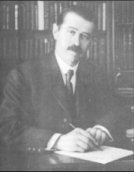
"To Me God is the Parent-Life, and therefore, the Father and ever present friend of all the souls that seek Him. He is the God of the Christians, but not a Christian God; the God of the Jews, but not a Jewish God; the God of the Brahmans, but not a Brahman God; the God of the Mohammedans but not a Mohammedan God."
Abraham Mitrie Rihbany, Seven Days with God, 1926.
|
|
About The Author
When Ibrahim Mitrie Rihbani, aged nine, reported to work in Mt. Lebanon - Syria as a stone-cutter apprentice in 1878, few doubted that he would carry on with that family tradition. But by the time he died in America in 1944, he had engaged in international politics, acquired a Ph.D. in Divinity, and had become an accomplished writer with eight titles to his credit, among them a best seller.
Rihbani was born in Shweir, Mt. Lebanon, in 1869 to a poor family headed by a well-respected builder. In 1875, the family moved to the town of Btater where the father was appointed foreman in charge of the industrial concerns of a Frenchman, Monsieur Lafortune, known by his Arabised name: Al-Fartouni.
At age 17, Rihbani felt a deep desire for education and joined the Presbyterian school in Souk Al-Gharb, a "giant" sitting with first grade students. However, he advanced very quickly, and in two years he was at a school level commensurate with his age. In 1891, he immigrated to America due to the Ottomans' oppression in Syria and his personal lot of poverty.
In New York he worked as an assistant storekeeper. A year later, he was appointed editor of the first Arabic newspaper in the New World, Kawkab America. He worked in this capacity for one year, after which he quit because the owner would not dare criticise the Ottoman Sultan for fear of reprisal against his extended family in Syria.
While still in Syria, Rihbani abandoned the Greek Orthodox Church and became a Presbyterian. After leaving the newspaper he did not go back into the world of commerce, but embarked on a tour of American churches in the Mid-West to speak about the "Holy Land," with nothing but his broken English and raw ideas translated directly from Arabic. After a few years of hardship and struggle, and having become quite fluent in English, he was officially invited to become the resident minister in a church in the town of Morenci, Ohio.
In 1913 he wrote his first book, A Far Journey, in which he chronicled his life until that point in time. Shortly thereafter, he started to write a monthly article in the prestigious Atlantic Monthly under the heading "The Syrian Christ". Those articles were published in 1916 in a book bearing the same title, and which was reprinted 17 times between 1916 and 1937.
In 1917, he published Militant America and Jesus Christ, a book arguing for America's intervention in WWI. He followed it in 1918 with America Save the Near East, calling for an active American engagement in solving the "Syrian Question". He called for a united and independent, American-protected, Syrian federal republic with a national government in Damascus and state legislatures in Mt. Lebanon, Aleppo, and Palestine. He rejected Zionism fearing that it would sow hatred in the Middle East if it succeeded in seceding Palestine from Syria and creating a Jewish state against the will of the majority of Syrians. He warned that such a move would be a grave and dangerous mistake leading to war and tragedy. His prophetic warnings were not heeded as they ran contrary to the secret Sykes-Picot accord between the British and the French to divide Syria between them.
In 1919, Rihbani was chosen by the Syrian American Associations to be their representative at the Peace Conference in Versailles. There, he met with Prince Faisal and spent three months with him. His experience in those turbulent times was documented in a book titled Great Men from the East and from the West, which was published in 1923. Rihbani's political action did not yield the desired results, and after the entrenchment of the British and French mandates over Syria, he dedicated the rest of his life to the pulpit and to writing.
Rihbani's other books are The Hidden Treasure of Rasmoula, 1920, The Christ Story for Boys and Girls, 1923, Seven Days with God, 1926, and The Five Interpretations of Jesus, 1940. He died in Stamford, Connecticut in 1944.
| About The Author | Preface | Table of Contents |
|

